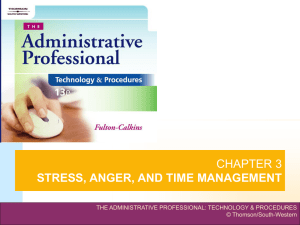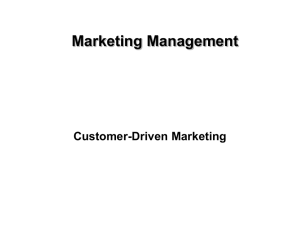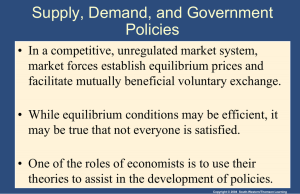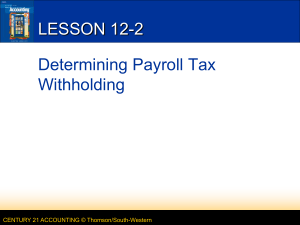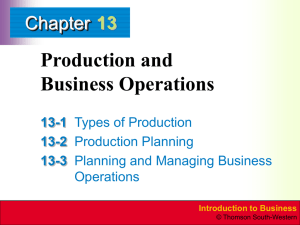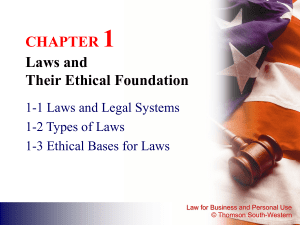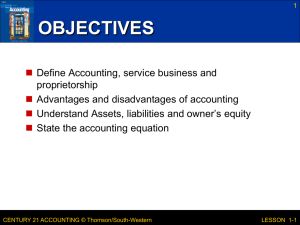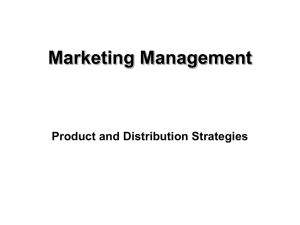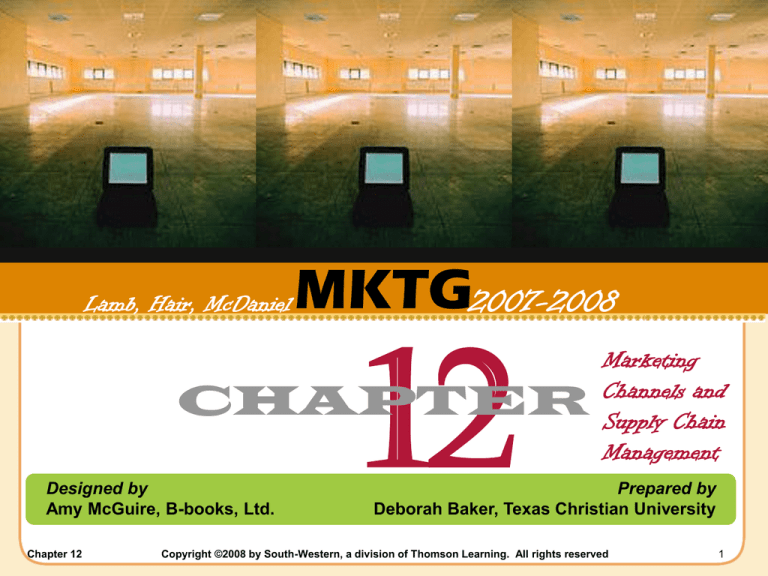
Lamb, Hair, McDaniel
MKTG2007-2008
12
CHAPTER
Designed by
Amy McGuire, B-books, Ltd.
Chapter 12
Marketing
Channels and
Supply Chain
Management
Prepared by
Deborah Baker, Texas Christian University
Copyright ©2008 by South-Western, a division of Thomson Learning. All rights reserved
1
Learning Outcomes
LO1
Explain what a marketing channel is
and why intermediaries are needed
LO2
Define the types of channel intermediaries
and describe their functions and activities
LO3
Describe the channel structures for
consumer and business products and
discuss alternative channel arrangements
Chapter 12
Copyright ©2008 by South-Western, a division of Thomson Learning. All rights reserved
2
Learning Outcomes
LO4
Define supply chain management
and discuss its benefits
LO5
Discuss the issues that influence
channel strategy
LO6
Explain channel leadership,
conflict, and partnering
LO7
Describe the logistical components
of the supply chain
Chapter 12
Copyright ©2008 by South-Western, a division of Thomson Learning. All rights reserved
3
Learning Outcomes
LO8
Discuss new technology and
emerging trends in supply chain
management
LO9
Discuss channels and distribution
decisions in global markets
Chapter 12
Copyright ©2008 by South-Western, a division of Thomson Learning. All rights reserved
4
LO1
Marketing Channels
Explain what a
marketing channel is
and why intermediaries
are needed
Chapter 12
11
Copyright ©2008 by South-Western, a division of Thomson Learning. All rights reserved
5
Marketing Channels
Marketing
Channels
A set of interdependent
organizations that ease
the transfer of ownership
as products move from
producer to business
user or consumer.
LO1
Chapter 12
Copyright ©2008 by South-Western, a division of Thomson Learning. All rights reserved
6
Marketing Channels
Supply Chain
The connected chain of
all the business entities,
both internal and external
to the company, that
perform or support the
logistics function.
LO1
Chapter 12
Copyright ©2008 by South-Western, a division of Thomson Learning. All rights reserved
7
Marketing Channel Functions
Specialization and division of labor
Overcoming discrepancies
Providing contact efficiency
LO1
Chapter 12
Copyright ©2008 by South-Western, a division of Thomson Learning. All rights reserved
8
Specialization and Division of Labor
Creates greater efficiency
Provides lower costs
Achieves economies of scale
Aids producers who lack resources to
market directly
Builds good relationships with customers
LO1
Chapter 12
Copyright ©2008 by South-Western, a division of Thomson Learning. All rights reserved
9
Overcoming Discrepancies
Discrepancy
of
Quantity
The difference between the
amount of product produced
and the amount an end user
wants to buy.
Discrepancy
of
Assortment
The lack of all the items a
customer needs to receive full
satisfaction from a product or
products.
LO1
Chapter 12
Copyright ©2008 by South-Western, a division of Thomson Learning. All rights reserved
10
Overcoming Discrepancies
Temporal
Discrepancy
A situation that occurs when a
product is produced but a
customer is not ready to buy it.
Spatial
Discrepancy
The difference between the
location of a producer and the
location of widely
scattered markets.
LO1
Chapter 12
Copyright ©2008 by South-Western, a division of Thomson Learning. All rights reserved
11
Providing Contact Efficiency
LO1
Chapter 12
Copyright ©2008 by South-Western, a division of Thomson Learning. All rights reserved
12
LO1 REVIEW LEARNING OUTCOME
Marketing
Channel
Marketing Channels
Providing Specialization
and Division of Labor
Overcoming
Discrepancies
Providing Contact
Efficiency
Supply
Chain
Chapter 12
Copyright ©2008 by South-Western, a division of Thomson Learning. All rights reserved
13
LO2
Channel Intermediaries
Define the types of
channel intermediaries
and describe their
functions and activities
Chapter 12
11
Copyright ©2008 by South-Western, a division of Thomson Learning. All rights reserved
14
Intermediaries/Middlemen
A company or person that renders services
related to the sale or purchase of a product as it
flows from the producer to the consumer.
Disintermediation - process by which traditional
intermediaries are eliminated as companies
question the value added by layers in the
distribution channel
• You can eliminate middlemen, but not the
essential distribution activities they
perform
– Doesn’t necessarily reduce costs
Chapter 12
11
Copyright ©2008 by South-Western, a division of Thomson Learning. All rights reserved
15-15
15
Channel Intermediaries
Retailer
A channel intermediary that
sells mainly to customers.
Merchant
Wholesaler
An institution that buys goods
from manufacturers, takes title
to goods, stores them,
and resells and ships them.
Agents and
Brokers
Wholesaling intermediaries who
facilitate the sale of a product by
representing channel members.
LO2
Chapter 12
11
Copyright ©2008 by South-Western, a division of Thomson Learning. All rights reserved
16
Channel Intermediaries
Retailers
Take Title to Goods
Merchant
Wholesalers
Take Title to Goods
Agents
and
Brokers
Do NOT Take Title to Goods
LO2
Chapter 12
11
Copyright ©2008 by South-Western, a division of Thomson Learning. All rights reserved
17
Factors Suggesting Type of
Wholesaling Intermediary to Use
Product characteristics
Buyer considerations
Market characteristics
LO2
Chapter 12
11
Copyright ©2008 by South-Western, a division of Thomson Learning. All rights reserved
18
Factors Suggesting Type of
Wholesaling Intermediary to Use
Factor
Merchant
Wholesalers
Agents/
Brokers
Nature of product
Standard
Nonstandard,
custom
Technicality of product
Complex
Simple
Product’s gross margin
High
Low
Frequency of ordering
Frequent
Infrequent
Time between order and receipt
of shipment
Shorter lead time
Longer lead time
Number of customers
Many
Few
Concentration of customers
Dispersed
Concentrated
LO2
Chapter 12
11
Copyright ©2008 by South-Western, a division of Thomson Learning. All rights reserved
19
Channel Functions
Performed by Intermediaries
Contacting/Promotion
Transactional
Functions
Negotiating
Risk Taking
Physically distributing
Logistical
Functions
Storing
Sorting
LO2
Chapter 12
11
Facilitating
Functions
Researching
Financing
Copyright ©2008 by South-Western, a division of Thomson Learning. All rights reserved
20
Logistics
Logistics
The process of strategically
managing the efficient flow
and storage of raw materials,
in-process inventory, and
finished goods from point of
origin to point of
consumption.
LO2
Chapter 12
11
Copyright ©2008 by South-Western, a division of Thomson Learning. All rights reserved
21
LO2 REVIEW LEARNING OUTCOME
Channel Intermediaries and Functions
CHANNEL
INTERMEDIARIES
CHANNEL
FUNCTIONS
Perform
Retailers
Transactional
Wholesalers
Logistical
Agents and Brokers
Facilitating
Chapter 12
Copyright ©2008 by South-Western, a division of Thomson Learning. All rights reserved
22
LO3
Channel Structures
Describe the channel
structures for
consumer and
business products and
discuss alternative
channel arrangements
Chapter 12
11
Copyright ©2008 by South-Western, a division of Thomson Learning. All rights reserved
23
LO3 Channels for Consumer Products
Direct
Channel
A distribution channel in
which producers sell
directly to consumers.
Chapter 12
11
Copyright ©2008 by South-Western, a division of Thomson Learning. All rights reserved
24
LO3 Channels for Consumer Products
Direct
Channel
Retailer
Channel
Wholesaler
Channel
Agent/Broker
Channel
Producer
Producer
Producer
Producer
Agents or
Brokers
Consumers
Chapter 12
11
Wholesalers
Wholesalers
Retailers
Retailers
Retailers
Consumers
Consumers
Consumers
Copyright ©2008 by South-Western, a division of Thomson Learning. All rights reserved
25
Consumer Channels
15-26
Chapter 12
11
Copyright ©2008 by South-Western, a division of Thomson Learning. All rights reserved
26
LO3
Channels for Business Products
Direct
Channel
Direct
Channel
Producer
Producer
Agent/Broker
Industrial Agent/Broker Industrial
Distributor
Channel
Channel
Producer
Producer
Producer
Agents or
Brokers
Agents or
Brokers
Industrial
Distributor
Industrial
Distributor
Industrial
User
Chapter 12
11
Govt.
Buyer
Industrial
User
Industrial
User
Industrial
User
Copyright ©2008 by South-Western, a division of Thomson Learning. All rights reserved
27
B2B Channels
15-28
Chapter 12
11
Copyright ©2008 by South-Western, a division of Thomson Learning. All rights reserved
28
LO3
Business-to-Business
Exchanges on the Internet
Agents link buyers and sellers
Companies drop the intermediary
from the supply chain
“Private exchanges” with select
suppliers automate the supply chain
http://www.sherwinwilliams.com
Online
Chapter 12
11
Copyright ©2008 by South-Western, a division of Thomson Learning. All rights reserved
29
LO3
Alternative Channel
Arrangements
Multiple channels
Nontraditional channels
Strategic channel alliances
Chapter 12
11
Copyright ©2008 by South-Western, a division of Thomson Learning. All rights reserved
30
LO3 REVIEW LEARNING OUTCOME
Channel Structures
CONSUMER
CHANNELS
BUSINESS
CHANNELS
ALTERNATIVE
CHANNELS
Direct
Direct
Multiple
Retail
Industrial
Nontraditional
Wholesaler
Agent/broker
Agent/broker
Agent/broker
industrial
Strategic
alliances
Chapter 12
Copyright ©2008 by South-Western, a division of Thomson Learning. All rights reserved
31
LO4
Supply Chain Management
Define supply chain
management and
discuss its benefits
Chapter 12
11
Copyright ©2008 by South-Western, a division of Thomson Learning. All rights reserved
32
Supply Chain Management
Supply Chain
The supply chain includes all the
firms that engage in activities that
are necessary to convert raw
materials into a good or service and
put it in the hands of the consumer
or business customer
Supply chain management is the
management of flows among the
LO4
Chapter 12
firms in a supply chain to maximize
total profitability
Copyright ©2008 by South-Western, a division of Thomson Learning. All rights reserved
33
Supply Chain
15-34
Chapter 12
Copyright ©2008 by South-Western, a division of Thomson Learning. All rights reserved
34
Role of Supply Chain Management
Communicator
of customer demand
from point of sale
to supplier
Physical flow process
that engineers the
movement of goods
LO4
Chapter 12
Copyright ©2008 by South-Western, a division of Thomson Learning. All rights reserved
35
Responsibilities of
Supply Chain Managers
Channel strategy decisions
Sourcing and procurement of raw materials
Production schedules
Order processing
Inventory management
Finished goods/supplies transportation and storage
Customer service coordination
Supply chain information flow management
LO4
Chapter 12
Partner relationships
Copyright ©2008 by South-Western, a division of Thomson Learning. All rights reserved
36
The Supply Chain Process
LO4
Chapter 12
Copyright ©2008 by South-Western, a division of Thomson Learning. All rights reserved
37
Benefits of Supply
Chain Management
Means of differentiation
Reduced costs
Greater supply chain flexibility
Improved customer service
Higher revenues
LO4
Chapter 12
Copyright ©2008 by South-Western, a division of Thomson Learning. All rights reserved
38
LO4 REVIEW LEARNING OUTCOME
Supply Chain Management
Chapter 12
Copyright ©2008 by South-Western, a division of Thomson Learning. All rights reserved
39
LO5
Making Channel Strategy Decisions
Discuss the issues
that influence
channel strategy
Chapter 12
11
Copyright ©2008 by South-Western, a division of Thomson Learning. All rights reserved
40
LO5
Chapter 12
11
Channel Strategy Decisions
Factors
Affecting
Channel
Choice
Level of
Distribution
Intensity
Market Factors
Intensive Distribution
Product Factors
Selective Distribution
Producer Factors
Exclusive Distribution
Copyright ©2008 by South-Western, a division of Thomson Learning. All rights reserved
41
LO5
Market Factors
Customer profiles
Consumer or Industrial
Customer
Market
Factors
That Affect
Channel
Choices
Chapter 12
11
Size of market
Geographic location
Copyright ©2008 by South-Western, a division of Thomson Learning. All rights reserved
42
LO5
Product Factors
Product Complexity
Product Price
Product Standardization
Product
Factors
That Affect
Channel
Choices
Chapter 12
11
Product Life Cycle
Product Delicacy
Copyright ©2008 by South-Western, a division of Thomson Learning. All rights reserved
43
LO5
Product Factors
Producer Resources
Number of Product Lines
Producer
Factors
That Affect
Channel
Choices
Chapter 12
11
Desire for Channel Control
Copyright ©2008 by South-Western, a division of Thomson Learning. All rights reserved
44
LO5 Levels of Distribution Intensity
Chapter 12
11
Intensive
A form of distribution aimed at
having a product available in
every outlet
Selective
A form of distribution achieved
by screening dealers to eliminate
all but a few in any single area
Exclusive
A form of distribution that
established one or a few
dealers within a given area
Copyright ©2008 by South-Western, a division of Thomson Learning. All rights reserved
45
LO5 Levels of Distribution Intensity
Chapter 12
11
Intensity
Level
Objective
Number of
Intermediaries
Intensive
Achieve mass market
selling.
Convenience goods.
Many
Selective
Work with selected
intermediaries.
Shopping and some
specialty goods.
Several
Exclusive
Work with single
intermediary. Specialty
goods and industrial
equipment.
Copyright ©2008 by South-Western, a division of Thomson Learning. All rights reserved
One
46
LO5 REVIEW LEARNING OUTCOME
Issues Influencing Channel Strategy
Chapter 12
Copyright ©2008 by South-Western, a division of Thomson Learning. All rights reserved
47
LO6 Managing Channel Relationships
Discuss the issues
that influence
channel strategy
Chapter 12
11
Copyright ©2008 by South-Western, a division of Thomson Learning. All rights reserved
48
Social Dimensions of Channels
Power
Control
Leadership
Conflict
LO6
Chapter 12
11
Partnering
Copyright ©2008 by South-Western, a division of Thomson Learning. All rights reserved
49
Channel Power, Control,
and Leadership
Channel
Power
A channel member’s capacity to control or
influence the behavior of other channel members
Channel
Control
A situation that occurs when one marketing
channel member intentionally affects another
member’s behavior
Channel
Leader
A member of a marketing channel that exercises
authority/power over the activities of other members
LO6
Chapter 12
11
Copyright ©2008 by South-Western, a division of Thomson Learning. All rights reserved
50
Channel Conflict and Partnering
Channel
Conflict
Channel
Partnering
A clash of goals and methods
between distribution channel
members
The joint effort of all channel
members to create a supply chain
that serves customers and
creates a competitive advantage
LO6
Chapter 12
11
Copyright ©2008 by South-Western, a division of Thomson Learning. All rights reserved
51
Channel Conflict
Conflicts may occur if channel members:
Have conflicting goals
Fail to fulfill expectations of other channel members
Have ideological differences
Have different perceptions of reality
LO6
Chapter 12
11
Copyright ©2008 by South-Western, a division of Thomson Learning. All rights reserved
52
Channel Partnering
Transaction-Based
Partnership-Based
Supplier /
Manufacturer
Relationships
Short-term
Adversarial
Independent
Price important
Long-term
Cooperative
Dependent
Value-added services
Number of
Suppliers
Many
Few
Information
Sharing
Minimal
High
Investment
Required
Minimal
High
LO6
Chapter 12
11
Copyright ©2008 by South-Western, a division of Thomson Learning. All rights reserved
53
LO6 REVIEW LEARNING OUTCOME
Channel Leadership, Conflict, & Partnering
Channel Power,
Control, Leadership
Channel
Partnering
Channel
Relationship
Synergy
Channel Conflict
Horizontal
Chapter 12
Vertical
Copyright ©2008 by South-Western, a division of Thomson Learning. All rights reserved
54
LO7
Global Issues in
Services Marketing
Discuss global issues
in services marketing
Chapter 12
11
Copyright ©2008 by South-Western, a division of Thomson Learning. All rights reserved
55
Logistical Components
of the Supply Chain
Supply
Chain
Team
LO7
Chapter 12
11
Logistics Information System
Sourcing & Procurement
Production Scheduling
Order Processing
Inventory Control
Warehouse & Materials Handling
Transportation
Copyright ©2008 by South-Western, a division of Thomson Learning. All rights reserved
56
Sourcing and Procurement
The Role of Purchasing:
Plan purchasing strategies
Develop specifications
Select suppliers
Negotiate price and service levels
LO7
Chapter 12
11
Reduce costs
Copyright ©2008 by South-Western, a division of Thomson Learning. All rights reserved
57
Production Scheduling
Traditional Focus
Customer Focus
Push / Pull
Strategy
Push
Pull
Start of
Production
InventoryBased
Customer-Order
Based
Manufacturing
Mass Production
Mass Customization
LO7
Chapter 12
11
Copyright ©2008 by South-Western, a division of Thomson Learning. All rights reserved
58
Just-in-Time Manufacturing
JIT
LO7
Chapter 12
11
A process that redefines and
simplifies manufacturing by
reducing inventory levels and
delivering raw materials just
when they are needed on the
production line.
Copyright ©2008 by South-Western, a division of Thomson Learning. All rights reserved
59
Benefits of JIT
Reduces raw material inventories
Shortens lead times
Creates better supplier relationships
Reduces production and storeroom costs
Reduces paperwork
LO7
Chapter 12
11
Copyright ©2008 by South-Western, a division of Thomson Learning. All rights reserved
60
JIT Requirements
Receive high-quality parts
Meet supplier delivery commitments
Have a crisis management plan
LO7
Chapter 12
11
Copyright ©2008 by South-Western, a division of Thomson Learning. All rights reserved
61
Order Processing
Electronic
Data
Interchange
LO7
Information technology that
replaces paper documents that
accompany business
transactions with electronic
transmission of the information.
http://www.walmartstores.com
Online
Chapter 12
11
Copyright ©2008 by South-Western, a division of Thomson Learning. All rights reserved
62
Order Processing
Inventory
Control
System
A method of developing
and maintaining an
adequate assortment of
materials or products to
meet a manufacturer’s or
a customer’s demand.
LO7
Chapter 12
11
Copyright ©2008 by South-Western, a division of Thomson Learning. All rights reserved
63
Order Processing
Materials
Requirement
Planning
(MRP)
An inventory control system that manages
the replenishment of raw materials,
supplies, and components from the
supplier to the manufacturer.
Distribution
Resource
Planning
(DRP)
An inventory control system that manages
the replenishment of goods from the
manufacturer to the final consumer.
LO7
Chapter 12
11
Copyright ©2008 by South-Western, a division of Thomson Learning. All rights reserved
64
Materials Handling Functions
Receive goods into
warehouse
Identify, sort, and label
goods
Dispatch the goods to
temporary storage
LO7
Chapter 12
11
Recall, select, or pick the
goods for shipment
Copyright ©2008 by South-Western, a division of Thomson Learning. All rights reserved
65
Transportation
Airways
Water
Pipelines
Motor Carriers
Railroads
LO7
Chapter 12
11
Copyright ©2008 by South-Western, a division of Thomson Learning. All rights reserved
66
Transportation Mode Choice
Cost
Transit time
Reliability
Capability
Accessibility
Traceability
LO7
Chapter 12
11
Copyright ©2008 by South-Western, a division of Thomson Learning. All rights reserved
67
Criteria for Ranking
Modes of Transportation
Lowest
Highest
Relative
Cost
Transit
Time
Air
Truck
Rail
Pipe
Water
Water
Rail
Pipe
Truck
Air
Reliability
Pipe
Truck
Rail
Air
Water
Capability
Water
Rail
Truck
Air
Pipe
Accessibility Truck
7
LO
Traceability
Air
Rail
Air
Water
Pipe
Truck
Rail
Water
Pipe
Chapter 12
11
Copyright ©2008 by South-Western, a division of Thomson Learning. All rights reserved
68
LO8
Trends in Supply Chain
Management
Discuss new
technology and
emerging trends in
supply chain
management
Chapter 12
11
Copyright ©2008 by South-Western, a division of Thomson Learning. All rights reserved
69
Trends in Supply Chain
Management
Advanced computer technology
Outsourcing of logistics functions
Electronic distribution
LO8
Chapter 12
11
Copyright ©2008 by South-Western, a division of Thomson Learning. All rights reserved
70
Advanced Computer
Technology
Automatic identification systems
- Bar coding
- Radio frequency technology
Communications technology
Supply chain software systems
LO8
Chapter 12
11
Copyright ©2008 by South-Western, a division of Thomson Learning. All rights reserved
71
Outsourcing Logistics
Functions
Outsourcing Benefits
Reduce inventories
Locate stock at fewer plants and
distribution centers
LO8
Chapter 12
11
Provide same or better levels of service
Copyright ©2008 by South-Western, a division of Thomson Learning. All rights reserved
72
LO9
Channels and Distribution
Decisions for Global Markets
Discuss channels and
distribution decisions
in global markets
Chapter 12
11
Copyright ©2008 by South-Western, a division of Thomson Learning. All rights reserved
73
Channels and Distribution
Decisions for Global Markets
Global Channel
Development
Channel structure
and type differ
Gray marketing channels
Awareness of trade legalities
Global Supply
Chain Management
Transportation Issues
LO9
Chapter 12
11
Copyright ©2008 by South-Western, a division of Thomson Learning. All rights reserved
74
LO9 REVIEW LEARNING OUTCOME
Global Market Channel
& Distribution Decisions
Distribute directly or through
foreign partners
Different channel structures than in
domestic markets
Illegitimate “gray”
marketing channels
Legal and infrastructure differences
Chapter 12
Copyright ©2008 by South-Western, a division of Thomson Learning. All rights reserved
75
Beyond the Book
Channels and Distribution
Decisions for Services
Chapter 12
11
Identify the special
problems and
opportunities
associated with
distribution in service
organizations
NOTE: Supplemental content – not in book.
Copyright ©2008 by South-Western, a division of Thomson Learning. All rights reserved
76
Beyond the Book
Channels and Distribution Decisions
for Services
Chapter 12
11
Minimizing wait times
Managing service capacity
Improving service delivery
NOTE: Supplemental content – not in book.
Copyright ©2008 by South-Western, a division of Thomson Learning. All rights reserved
77
Beyond the Book
Chapter 12
11
Distribution in Service
Organizations
NOTE: Supplemental content – not in book.
Copyright ©2008 by South-Western, a division of Thomson Learning. All rights reserved
78

